
Holbrook's southern dusky salamander, previously known as the southern dusky salamander, is a species of salamander endemic to the southeastern United States. Older sources often refer to it as the eared triton. Formerly abundant, it has precipitously declined since the 1960s.

Desmognathus fuscus is a species of amphibian in the family Plethodontidae. The species is commonly called the dusky salamander or northern dusky salamander to distinguish it from populations in the southern United States which form several distinct species, the southern dusky salamanders. The northern dusky salamander is the most widespread representative of its genus in Canada. It can be found in eastern North America from extreme eastern Canada in New Brunswick south to South Carolina. The size of the species' total population is unknown, but is assumed to easily exceed 100,000. The species' habitat differs somewhat geographically; dusky salamanders in the northern part of the range prefer rocky woodland streams, seepages, and springs, while those in the south favor floodplains, sloughs, and muddy places along upland streams. They are most common where water is running or trickling. They hide under various objects, such as leaves or rocks, either in or near water. Alternatively, they may enter burrows for protection. The dusky salamander lays its eggs close to water under moss or rocks, in logs, or in stream-bank cavities. The larval stage which follows is normally aquatic.

The imitator salamander is a species of salamander in the family Plethodontidae. It is endemic to the Appalachian Mountains in the southeastern United States.

The shovelnose salamander is a species of salamander in the family Plethodontidae. It is endemic to the United States.
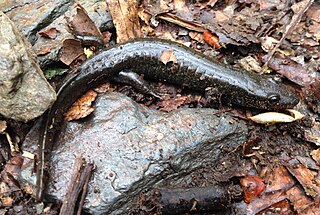
The blackbelly salamander is a species of salamander in the family Plethodontidae. It is endemic to the United States. Its natural habitats are rivers, intermittent rivers, and freshwater springs. It is threatened by habitat loss.
The Shasta salamander is a species of salamander in the family Plethodontidae. It is endemic to Shasta County in California.

Hillis's dwarf salamander is a species of salamander endemic to the southern United States.

The southern grotto salamander is a species of salamander in the family Plethodontidae. It is endemic to northern Arkansas in the United States.
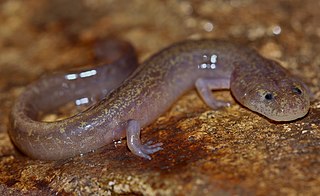
The northern grotto salamander is a species of salamander in the family Plethodontidae. It is endemic to the south-central United States.

The Samwel Shasta salamander is a species of salamander in the family Plethodontidae. It is endemic to Shasta County in California.
The Wintu Shasta salamander is a species of salamander in the family Plethodontidae. It is endemic to Shasta County in California.

Valentine's southern dusky salamander is a species of salamander in the family Plethodontidae. It is endemic to the southeastern United States.
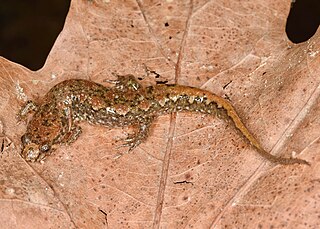
The spotted dusky salamander is a species of salamander in the family Plethodontidae. It is endemic to the United States.
The flat-headed salamander is a species of salamander in the family Plethodontidae. It is endemic to the United States, where it is known from Virginia and likely North Carolina.
The black shovel-nosed salamander is a species of salamander in the family Plethodontidae. It is endemic to the United States.
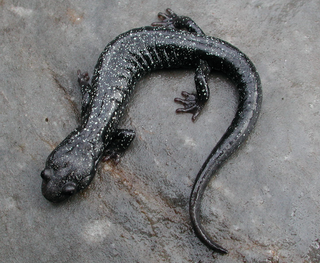
The Shasta black salamander is a species of salamander in the family Plethodontidae. It is endemic to Shasta County in California.

The Klamath black salamander is a species of salamander in the family Plethodontidae. It is endemic to the western United States.
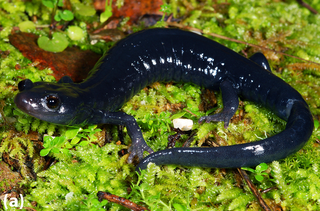
The Santa Cruz black salamander is a species of salamander in the family Plethodontidae. It is endemic to the U.S. state of California.

Sooglossoidea is a superfamily of frogs. It contains only two highly divergent families consisting of three genera with two species each, one family being found in southwestern India and the other in the Seychelles.
















